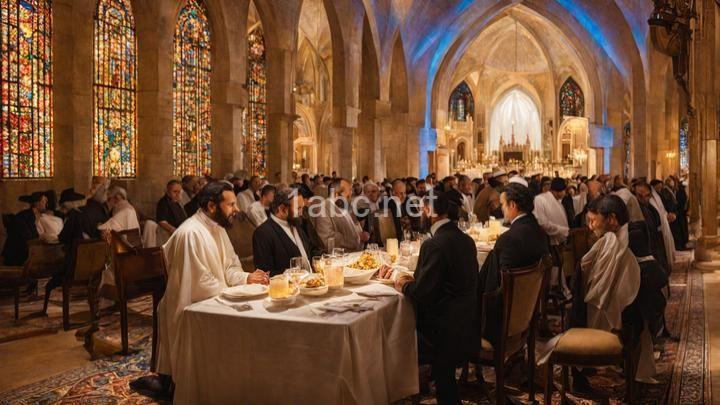Family Traditions during Yom Kippur: Strengthening Bonds and Passing on Heritage

Introduction:
Yom Kippur, the holiest day in the Jewish calendar, is a time of reflection, repentance, and renewal. It is a day when families come together to observe and celebrate their faith. Family traditions play a vital role in this observance, not only strengthening the bonds between family members but also serving as a way to pass on cultural heritage from one generation to the next.
Section 1: Preparing for Yom Kippur
Yom Kippur requires careful preparation both mentally and physically. Fasting, introspection, and repentance are key components of this solemn day. Involving the entire family in the preparations can make the experience more meaningful. Encourage your children to participate in cleaning and setting up a special prayer space at home. This can create a sense of anticipation and set the tone for the upcoming day of reflection and atonement.
Section 2: Break-Fast Meal
After a full day of fasting, the break-fast meal holds special significance. It is a time to come together as a family and nourish both the body and soul. Traditional recipes like kugel, challah bread, and noodle pudding are commonly enjoyed during this meal. Engaging your children in the meal preparation can create lasting memories and help them understand the importance of this special meal.
Section 3: Prayer Services
Yom Kippur is marked by several prayer services throughout the day. These services provide an opportunity for introspection, repentance, and seeking forgiveness. To make the prayer services more engaging for children, encourage their participation in songs or readings. This can help them connect with the prayers on a deeper level. For those looking to attend services, finding local synagogues or online resources can be a helpful way to ensure participation in the communal aspect of Yom Kippur.
Section 4: Intergenerational Activities
One of the most beautiful aspects of Yom Kippur is the opportunity for intergenerational connection. Incorporating activities that involve both older and younger family members can create a stronger bond and a deeper appreciation for the traditions. Consider organizing storytelling sessions where older family members share their experiences and memories related to Yom Kippur. These stories and personal anecdotes can serve as a bridge between generations, allowing children to learn and connect with their family's history.
Section 5: Acts of Tzedakah (Charity) and Giving Back
Yom Kippur is not only a day of personal reflection but also a day to consider our responsibilities to others. Acts of tzedakah, or charity, are an integral part of this observance. Encourage your family to engage in charitable activities together, such as volunteering at a local shelter or donating to a cause that resonates with your family's values. Teach your children the importance of giving back and involve them in age-appropriate ways to make a difference in the lives of others.
Conclusion:
Family traditions during Yom Kippur hold immense value. They not only strengthen the bonds between family members but also serve as a way to pass on cultural heritage and connect with our roots. As you embrace your own family traditions, remember to create new ones that resonate with your loved ones. Yom Kippur is a time for reflection, repentance, and renewal, and through these traditions, we can make it a meaningful and memorable experience for everyone involved.
FREQUENTLY ASKED QUESTIONS
Why is Yom Kippur important for families?
Yom Kippur, also known as the Day of Atonement, holds significant importance for families in the Jewish faith. This solemn holiday is observed by fasting, prayer, and reflection, allowing individuals and families to seek forgiveness and make amends for any wrongdoings committed throughout the year. It serves as a time for introspection and spiritual growth, fostering a sense of unity and closeness within families.Yom Kippur provides families with the opportunity to come together and participate in meaningful rituals and traditions. From attending synagogue services to reciting prayers and engaging in acts of charity, families are able to connect on a deeper level with their faith and with one another. The shared experience of observing Yom Kippur can strengthen familial bonds and create lasting memories.
Moreover, Yom Kippur encourages families to engage in self-reflection and introspection. It prompts individuals to evaluate their actions, behavior, and relationships, and to seek forgiveness from both others and themselves. This process can lead to personal growth, healing, and the strengthening of familial relationships.
Additionally, the act of fasting during Yom Kippur can be a unifying experience for families. By abstaining from food and drink for 24 hours, family members demonstrate solidarity and support for one another. This shared commitment to self-denial fosters empathy and understanding within the family unit.
In summary, Yom Kippur holds great importance for families as it provides a time for reflection, repentance, and unity. It allows families to deepen their connection to their faith, strengthen familial bonds, and engage in acts of self-improvement. By observing this sacred day together, families can grow spiritually and emotionally, creating a sense of closeness and harmony within the household.
What are some common family traditions during Yom Kippur?
Yom Kippur, the holiest day in the Jewish calendar, is a time for reflection, repentance, and forgiveness. While family traditions during Yom Kippur may vary, here are some common practices that many families observe:
-
Fasting: On Yom Kippur, it is customary for adults to fast from sundown to sundown the following day. This means abstaining from food and drink as a way of purifying the body and focusing on spiritual matters.
-
Attending synagogue: Families often gather at the synagogue for special Yom Kippur services, including Kol Nidre and Neilah. These services involve prayers, readings, and the sounding of the shofar.
-
Reflecting on the past year: Yom Kippur is a time for introspection and self-examination. Families may engage in discussions about personal growth, forgiveness, and setting intentions for the coming year.
-
Giving to charity: Tzedakah, or acts of charity, is an important aspect of Yom Kippur. Families may choose to donate money or volunteer their time to help those in need.
-
Breaking the fast: At the end of Yom Kippur, families come together to break the fast with a special meal. This meal often includes traditional dishes such as challah, fish, and kreplach.
-
Seeking reconciliation: Yom Kippur provides an opportunity for families to mend relationships and seek forgiveness. It is common for family members to apologize to one another and work towards reconciliation.
Remember, these are just a few examples of common family traditions during Yom Kippur. Each family may have their own unique customs and practices that hold special meaning for them.
How can families involve children in Yom Kippur traditions?
Yom Kippur is a meaningful time for families to come together and observe important traditions. Involving children in these traditions not only helps them connect with their heritage but also teaches them valuable lessons about repentance, forgiveness, and self-reflection. Here are some ways families can involve children in Yom Kippur traditions:
-
Attend synagogue services together: Take your children to synagogue services, where they can participate in prayers and listen to the meaningful sermons. Encourage them to ask questions and discuss the significance of the prayers and rituals.
-
Explain the meaning of fasting: Yom Kippur is a day of fasting, during which adults abstain from food and drink. While children may not be required to fast, explain to them the concept of self-discipline and how fasting helps us focus on our spiritual growth. Encourage them to try a mini-fast by skipping a meal or snack.
-
Engage in acts of charity: Teach your children the importance of giving back by involving them in acts of charity during Yom Kippur. Encourage them to donate a portion of their allowance to a charitable cause or participate in community service projects.
-
Reflect and apologize: Yom Kippur is a time for introspection and seeking forgiveness. Encourage your children to reflect on their actions and apologize to anyone they may have hurt or wronged. Help them understand the importance of taking responsibility for their actions and making amends.
-
Break the fast together: After a day of fasting, the breaking of the fast is a special moment for families. Involve your children in preparing a traditional meal or gathering together to enjoy a meal with loved ones. Use this time to discuss the significance of the day and share stories and memories.
Remember, the key is to involve children in age-appropriate ways and make the experience enjoyable for them. By incorporating these traditions into your family's Yom Kippur observance, you can create lasting memories and pass on the richness of Jewish heritage to the next generation.
Are there any specific foods associated with Yom Kippur?
Yom Kippur, the holiest day in the Jewish calendar, is a time of fasting and reflection. While there aren't any specific foods traditionally associated with this solemn observance, there are certain dishes that are commonly enjoyed before and after the fast. Many families will gather for a pre-fast meal called "seuda mafseket," which typically consists of light and nourishing foods such as soup, fish, and salads. After the fast is over, it is customary to break it with a festive meal called "break-fast," which often includes traditional Jewish foods like bagels, lox, kugel, and sweet treats. These meals are a meaningful part of the Yom Kippur experience, providing sustenance and bringing loved ones together.

